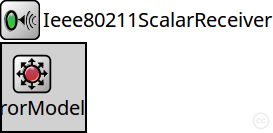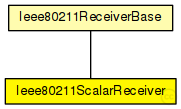 This documentation is released under the Creative Commons license
This documentation is released under the Creative Commons licenseThis receiver model receives an IEEE 802.11 transmission successfully if the minimum of the signal to noise and interference ratio over the duration of the reception is sufficiently high. It uses one of the IEEE 802.11 specific error models to compute the error rate based on this value and the used operation mode.
See also Ieee80211ScalarTransmitter, Ieee80211ScalarRadio, and Ieee80211ScalarRadioMedium.

The following diagram shows usage relationships between types. Unresolved types are missing from the diagram.

The following diagram shows inheritance relationships for this type. Unresolved types are missing from the diagram.

| Name | Type | Description |
|---|---|---|
| Ieee80211ReceiverBase | compound module |
This receiver model serves as the base module for IEEE 802.11 receivers. It supports switching channels, configuring different operation modes, and preamble modes. |
| Name | Type | Default value | Description |
|---|---|---|---|
| energyDetection | double |
no signal is detected at all below this reception power threshold (idle state) |
|
| sensitivity | double |
reception is not possible if the signal power is below sensitivity (idle or busy states) |
|
| snirThreshold | double |
reception is not successful if the SNIR is below this threshold (unsuccessful reception) |
|
| carrierFrequency | double |
center frequency of the band where this receiver listens on the medium |
|
| bandwidth | double |
bandwidth of the band where this receiver listens on the medium |
|
| errorModelType | string | "Ieee80211NistErrorModel" |
NED type of the error model |
| modulation | string | "BPSK" |
one of "BPSK", "16-QAM", "256-QAM" |
| opMode | string | ||
| bandName | string | ||
| channelNumber | int |
| Name | Value | Description |
|---|---|---|
| display | i=block/wrx | |
| class | Ieee80211ScalarReceiver |
// // This receiver model receives an IEEE 802.11 transmission successfully if the // minimum of the signal to noise and interference ratio over the duration of // the reception is sufficiently high. It uses one of the IEEE 802.11 specific // error models to compute the error rate based on this value and the used // operation mode. // // See also ~Ieee80211ScalarTransmitter, ~Ieee80211ScalarRadio, and // ~Ieee80211ScalarRadioMedium. // module Ieee80211ScalarReceiver extends Ieee80211ReceiverBase { parameters: @class(Ieee80211ScalarReceiver); }